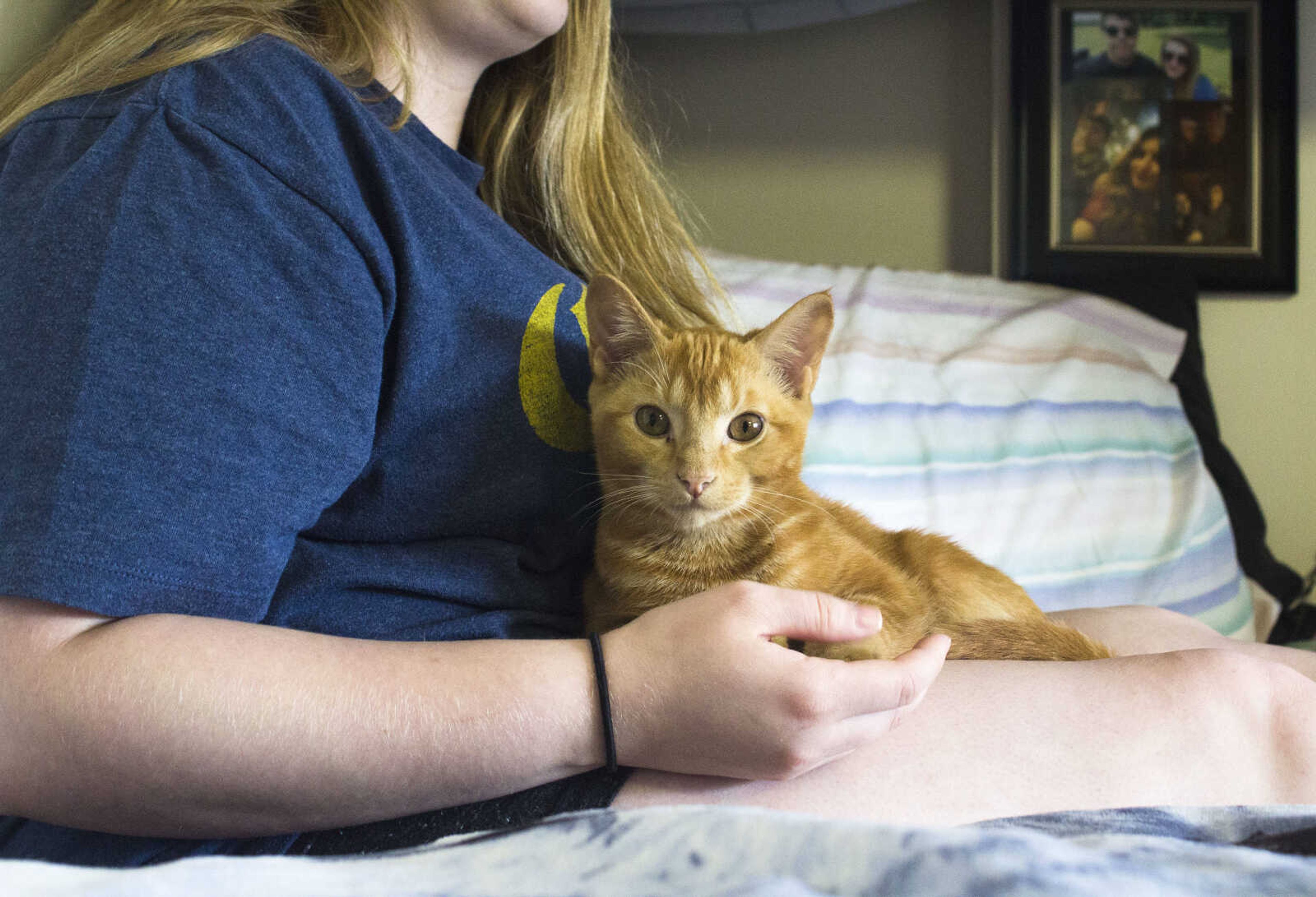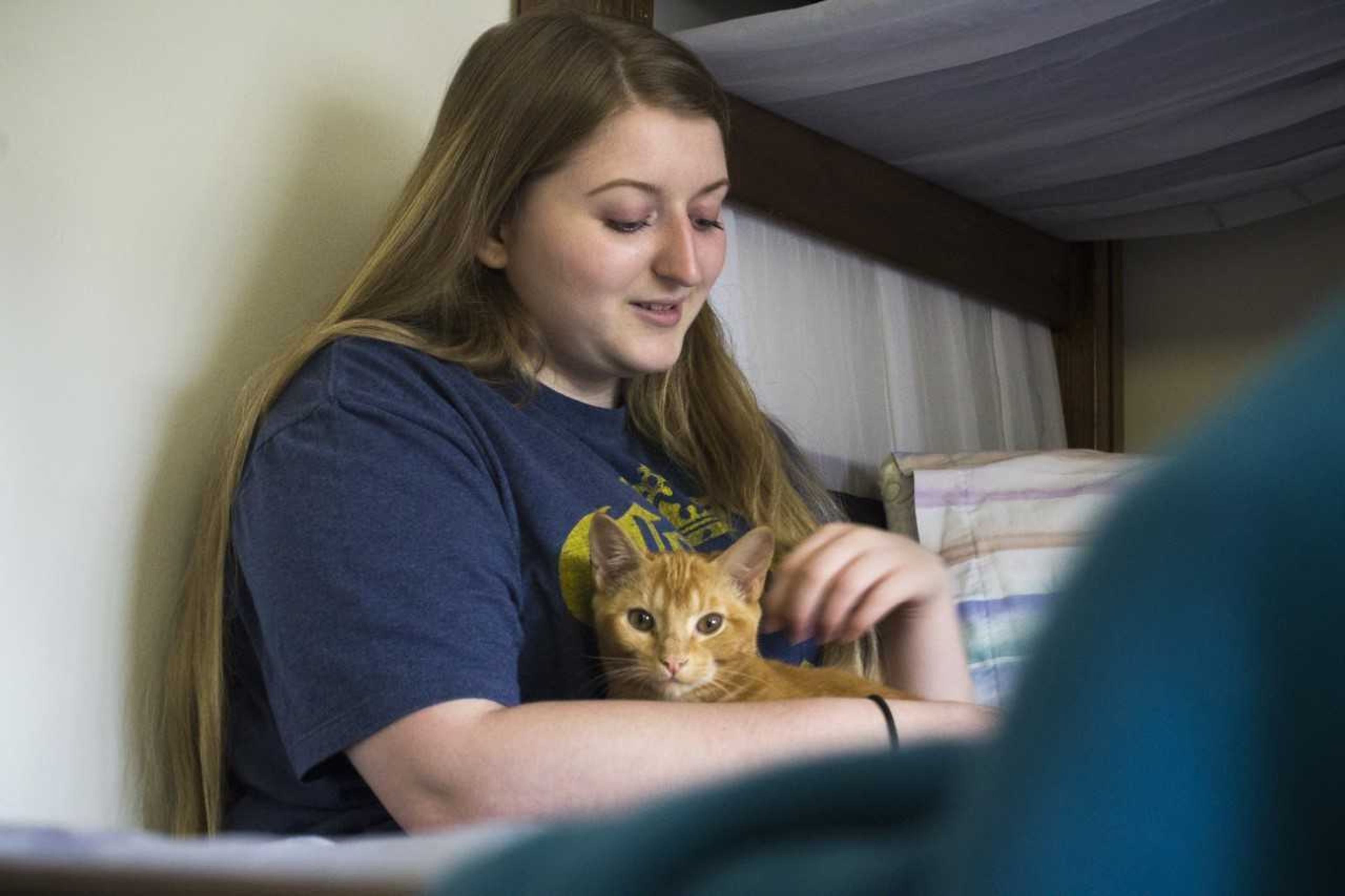For residents of Myers Hall, the age-old excuse “my dog ate my homework” might finally carry some weight.
Myers Hall is the home to Southeast
0s newest pet-friendly policy, and resident assistant Rachel Rigney is one of the first to take advantage, of making Southeast home to her 6-month-old orange tabby cat, Ollie.

This is the first semester students have been invited to house their pets on campus, and Rigney said there are only a handful of pets living in Myers Hall (four, according to Director of Residence Life Kendra Skinner), the only dormitory on campus to adopt the pet-friendly policy. In fact, Southeast joins a small number of schools, about 25, in the nation that are pet-friendly campuses.
The dorm currently houses dogs, one cat and a lizard.
Skinner said the idea of creating a pet-friendly community was centered around a question the university was trying to address.
“How do we look at some options within our residents halls that can help set some things apart for students and make this feel a little bit more like home?” Skinner said.
For now, only select areas are part of the pet community at Myers Hall, which only accommodates 92 students. When the announcement came that Southeast would become a pet-friendly campus came in April, Enrollment Management and Student Success vice president Debbie Below said pets would only be allowed to come to campus during the first two weeks of each semester.
Below also noted the restrictions which apply to prospective pets, which include age, weight and amount of time the owner has lived with the pet prior to the desired Southeast move-in date.
The announcement of its new status as pet-friendly earned Southeast national recognition.
For Rigney, a senior studying social work, making the transition to college life with Ollie has not been much of a transition at all. She said she grew up with multiple dogs and cats and has an English bulldog at home.
But moving to dorm life is a transition for pets, too. The demands of a university schedule can mean long stretches of time students spend away from their dorms and pets.
Rigney said Ollie does well in the dorm, even when she is away at class or an event. She even made sure to install some entertainment for Ollie when she is away, in the form of a six-foot cat tree, complete with scratching posts and fake mice.
“I kinda justified [bringing Ollie to school] because I am going to leave here next year and I will be doing an 8-to-5 schedule, and so there’s really not a difference if I had gotten him when I left here versus having him now,” Rigney said.
Still, Rigney said Ollie is a social cat and likes to sit in her lap while she does homework and makes friends with almost every visitor she has.
Residents who bring their pets to Myers must pay a $200 non-refundable registration/cleaning fee, which Rigney said helps protect the school in case the animals damage university property. The cleaning fee also helps future residents who may have pet allergies be able to live in the same spaces where a pet once lived.
As a resident assistant, Rigney is often the sounding board for residents’ issues. So far, she said, there have not been too many complaints about the new furry tenants.
Rigney thinks the biggest issue residents are dealing with is the noise pets make when their owners leave the dorm and the pets just “[want] to go with the pet owner.” Rigney said the barking usually does not last long and is not making residents want to move out of Myers Hall.
When the university announced the pet policy, Below said “pets must be able to be left alone in rooms without causing disruptions to the living community.”
Some noise from the animals is to be expected, Skinner said, but any pet noise that seems to be excessive is an issue the Office of Residence Life is still navigating. She said it also is an issue in the community of students with emotional support animals.
Skinner stressed that this is a pilot year for the pet-friendly program, and continuation of the program is not a guarantee.
“If we continue the program, I think there are definite things that we would need to consider [changing or adding to campus],” Skinner said. “I think we wanted to see what kind of animals people were bringing, and then as we started to see numbers increasing, [we would see] what else we were missing that we might need to provide.”
Skinner said she looked to one of Missouri’s only other pet-friendly schools, Stephens College, for inspiration on how to proceed at Southeast. Stephens has allowed pets to live on campus for years and has adapted the program to fit the large number of residents with pets. They even tote the slogan “the most pet-friendly campus on the planet.” Because of the college’s high pet volume, Stephens has developed programs like doggy day care and have designated, fenced-in outdoor spaces for pets to play in while their owner is away.
“Stephens is definitely at the forefront of a pet-friendly campus,” Skinner said. “I don’t know if we’ll go as big as what Stephens has done, but I think there’s definitely some things that we might want to say, ‘Hey that’s really a good idea.’”
Skinner noted the number of residents who brought pets was lower than anticipated, a fact she credits to the announcement’s late release in April. Many students, she said, already had made decisions about housing by the time it was announced. Others, she thinks, did not necessarily believe pets would truly be allowed on campus.
Admissions director Lenell Hahn said her office has helped spread the word about the pet-friendly community through Puppy Tours, where prospective students are encouraged to bring their dogs to campus and get a special tour of Myers Hall, along with more information about the campus pet policy.
“I definitely think it could [grow], obviously, as students are now realizing that we do have the pets there,” Skinner said.
For now, Rigney said Southeast’s pet policy is adequate for the number of pets who live in Myers Hall.
And while Ollie hasn’t made a meal of her homework yet, Rigney admitted, “he does like to nibble on paper.”





